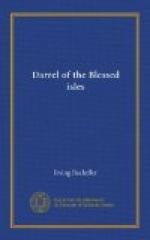He put the money in his pocket and made ready to go. He would leave at once in quest of Darrel and take counsel of him. It was early, and he could see the first light of the sun, high in the tall towers of hemlock. The forest rang with bird songs. He went to the brook near by, and drank of its clear, cold water, and bathed in it. Then he walked slowly to Robin’s Inn, where Mrs. Vaughn had begun building a fire. She observed the troubled look in his face, but said nothing of it then. Trove greeted her and went to the stable to feed his mare. As he neared the door he heard a loud “Whoa.” He entered softly, and the big barn, that joined the stable, began to ring with noise. He heard Tunk shouting “Whoa, whoa, whoa!” at the top of his voice. Peering through, he could see the able horseman leaning back upon a pair of reins tied to a beam in front of him. His cry and attitude were like those of a jockey driving a hard race. He saw Trove, and began to slow up.
“You are a brave man—there’s no doubt of it,” said the teacher.
“What makes ye think so?” Tunk inquired soberly, but with a glowing eye.
“If you were not brave, you’d scare yourself to death, yelling that way.”
“It isn’t possible, or Tunk would have perished long ago,” said the widow, who had come to feed her chickens.
“It’s enough to raise the neighbours,” Trove added.
“There ain’t any near neighbours but them over ’n the buryin’-ground, and they must be a little uneasy,” said the widow.
“Used t’ drive so much in races,” said Tunk, “got t’ be kind of a habit with me—seems so. Ain’t eggzac’ly happy less I have holt o’ the ribbons every day or two. Ye know I used t’ drive ol’ crazy Jane. She pulled like Satan. All ye had t’ do was t’ lean back an’ let ’er sail.”
“But why do you shout that way?”
“Scares the other hosses,” Tunk answered, dropping the reins and tossing his whip aside. “It’s a shame I have t’ fool my time away up here on a farm.”
He went to work at the chores, frowning with discontent. Trove watered and fed his mare and went in to breakfast. An hour later, he bade them all good-by, and set out for Allen’s. A new fear began to weigh upon him as he travelled. Was this a part of that evil sum, and had his father begun now to scatter what he had never any right to touch? Whoever brought him that big roll of money had robbed him of his peace. Even his ribs, against which it chafed as he rode along, began to feel sore. Home at last, he put up the mare and went to tell his mother that he must be off for Hillsborough.
“My son,” said she, her arms about his neck, “our eyes are growing dim and for a long time have seen little of you.”
“And I feel the loss,” Trove answered. “I have things to do there, and shall return tonight.”
“You look troubled,” was her answer. “Poor boy! I pray God to keep you unspotted of the world.” She was ever fearing unhappy news of the mystery—that something evil would come out of it.




